Mars Science Laboratory Blog
Subscribe
Posted by jbridges in Mars Science Laboratory Blog on August 22, 2013
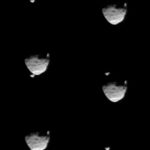
Mars has two moons Phobos – about 22km diameter, and Deimos which is about half that. MastCam has recently imaged an occultation where Phobos passed in front of the more distant Deimos. The first detailed images were retuned by Mariner 9 and Viking in the 1970s. In the MastCam images you can see their dark black […]
Posted in Uncategorized
Posted by jbridges in Mars Science Laboratory Blog on August 14, 2013
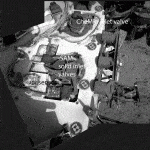
We have put a sample from the Cumberland drill hole into SAM for more isotopic measurements. The sample had been cached within the robotic arm’s turret. The NavCam image shows the current surface of the rover, inevitably with a bit more dust than when we landed. You can see the two SAM solid inlet valves, […]
Posted in Uncategorized
Posted by jbridges in Mars Science Laboratory Blog on August 9, 2013
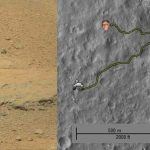
Here is a map showing close to our current location. We saw a pebble bed similar to what we found near Bradbury Landing on our first drive down Peace Vallis towards Yellowknife Bay. The rounded mm-cm sized pebbles were transported by a river and we are now seeing just how wide that river flow was.
Posted in Uncategorized
Posted by jbridges in Mars Science Laboratory Blog on August 6, 2013
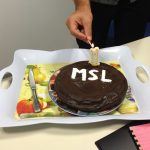
First Birthday gateaux at CNES, Toulouse.
Posted in Uncategorized
Posted by jbridges in Mars Science Laboratory Blog on August 5, 2013
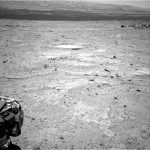
We are just about at the one Earth year anniversary of our landing. MSL Landing was on the 5th August Pacific time and about 6 am, 6th August British Summertime. What were the highlights so far? I think, after a succesful landing night, it was seeing the first images of the river conglomerate and the sediments […]
Posted in Uncategorized
Posted by jbridges in Mars Science Laboratory Blog on August 1, 2013
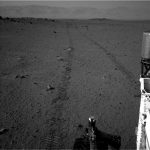
We have moved from southern summer into southern autumn (northern spring equinox). This means that gradually there will be less dust in the atmosphere and the images such as that of the crater rim seen on the horizon of the NavCam mosaics will become clearer. We are settling into a new routine of long daily drives towards […]
Posted in Uncategorized
Posted by jbridges in Mars Science Laboratory Blog on July 25, 2013
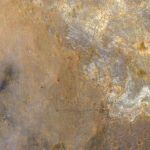
This HiRISE image shows Curiosity at work at the Shaler outcrop in Yellowknife Bay. The tracks from Bradbury landing are also clearly visible. Thanks to the rover mobility and instrument set we now know that the layers in Yellowknife Bay are sediments, deposited in water. Understanding the layers in Mars imagery is a big step forward in […]
Posted in Uncategorized
Posted by jbridges in Mars Science Laboratory Blog on July 19, 2013
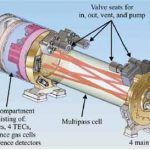
The first results of the atmospheric analyses have been published this week in Science Magazine. Let by Chris Webster and the SAM team, largely from NASA AMES and jpl, they have used the Tuneable Laser Spectrometer to measure the different isotopic abundances in the current atmosphere. The TLS works through absorption of energy from the lasers by […]
Posted in Uncategorized
Posted by jbridges in Mars Science Laboratory Blog on July 18, 2013
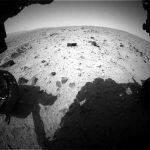
We are getting into the new routine of driving e.g. 30 or 40 m per day together with science observations, in particular from the mast instruments. The landscape is changing as we are no longer surrounded by outcrops and instead there are scattered rocks which are a mixture of rocks eroded from underlying layers and ejecta […]
Posted in Uncategorized
Posted by jbridges in Mars Science Laboratory Blog on July 12, 2013

Operations week at Toulouse is coming to an end and is switching back to the Lawrence Livermore Laboratory. In Toulouse the opeations centre is housed by the French Space Agency CNES. During the week as we exit Yellowknife Bay, we have been taking lots of ChemCam rasters and RMI images to go with the […]
Posted in Uncategorized












Recent Comments